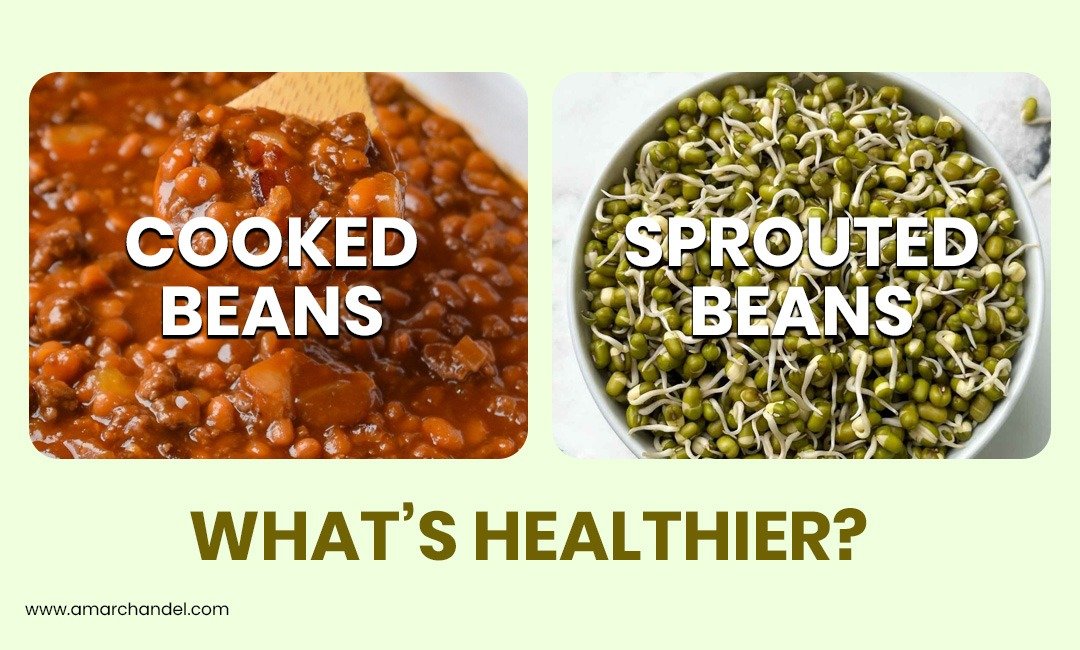Pulses like lentils, chickpeas, mung beans, and rajma are dietary pillars across India—protein-rich, fibre-loaded, and packed with phytonutrients. Yet, they generally require cooking. In recent years, sprouting has grown popular, especially for mung and kala chana. Which form offers greater health benefits: cooking (boiling/steaming) or sprouting? New comparisons offer insight.
A head-to-head study originally featured on NutritionFacts compared boiled beans with sprouted beans and raw beans using polyphenol content, antioxidant power, and in vitro bioactivity against cancer cells and neural cells. They found that while sprouted beans had higher levels of some polyphenols and lower of others, boiled beans edged slightly ahead in total antioxidant capacity.
However, the most striking result came from the in vitro cancer assays. Boiled bean extracts inhibited breast cancer cell proliferation at concentrations roughly 40 times lower than raw bean extracts; sprouted beans showed nearly similar potency to boiled beans. Raw bean extracts had no effect at all. For melanoma cells, both boiled and sprouted beans were effective; boiled beans remained stronger against kidney cancer, while sprouted showed no impact there.
The study additionally assessed neuroprotective effects on astrocytes—cells vital for brain health. Boiled bean extract was safe and even protective against oxidative injury in cultured astrocytes; sprouted beans offered less protection in this context.
Indian-centred work on mung bean sprouting supports these findings biologically. Sprouting reduces anti-nutrients like phytates by up to 76%, leading to a 3-fold increase in zinc absorption and 2.4-fold in iron absorption, essential for Indian diets where pulses are key nutrient sources. Analyses show that mung bean sprouts have significantly higher levels of phenolic acids and flavonoids, and consequently increased antioxidant activity compared to cooked or raw beans, though specific cancer assays are pending.
Sprouting also enhances the bioavailability of B vitamins, amino acids, fibre, and reduces lectins, making digestion easier—especially important in sensitive individuals or children. But these benefits must be weighed against food safety: raw sprouts can harbour Salmonella or E. coli, so steaming sprouted beans for a few minutes is a prudent practice—helping digestibility and reducing gut irritation while retaining much of the nutrition.
In India, steaming sprouted mung or chickpeas for 5–7 minutes preserves much of their nutrient value while making them gut-friendly. This aligns with traditional practices where sprouted dals are lightly boiled or tempered with spices.
So, what’s the takeaway for Indian diets? If sprouting helps you eat more beans (e.g. sprouted moong chaat, salad or dahi chana), it’s excellent. If canned, boiled, or pressure‑cooked beans make pulse consumption easier and more reliable, that’s powerful too—the in vitro tumour-fighting data favours cooking. Both forms are beneficial and complementary.

Given India’s diverse culinary habits, combining both might be ideal: regularly cook and enjoy pulses in curries, dal or rice, while also including a small serving of sprouted and steamed beans as snacks or salads. This maximises variety and benefit.
In summary, boiled pulses show stronger anticancer activity in cell studies, while sprouted beans improve mineral absorption and digestibility. Choose whichever form encourages you to consume more legumes overall—and do both safely and in moderation.
References
• Harvard NutritionFacts video: “Cooked Beans or Sprouted Beans?” detailing polyphenol, antioxidant, and in vitro cell studies
• Ganesan K et al., review on polyphenols and antioxidant changes through soaking, cooking, digestion of beans
• Kapravelou G et al., 2020 study on germination improving mung bean’s functional value
• Waliat S et al., 2023 review on sprouts’ enhanced antioxidant levels via increased polyphenols and vitamin C
• López A et al., 2013: effect of cooking on phenolic composition and anticancer/neuroprotective potential
• Hou D et al., 2019: mung bean sprouting reduces phytic acid by ≈76%, boosts iron and zinc bioavailability
• Indian Express, HealthShots articles 2022–23 on sprouted moong benefits and safe preparation advice


Give a Reply